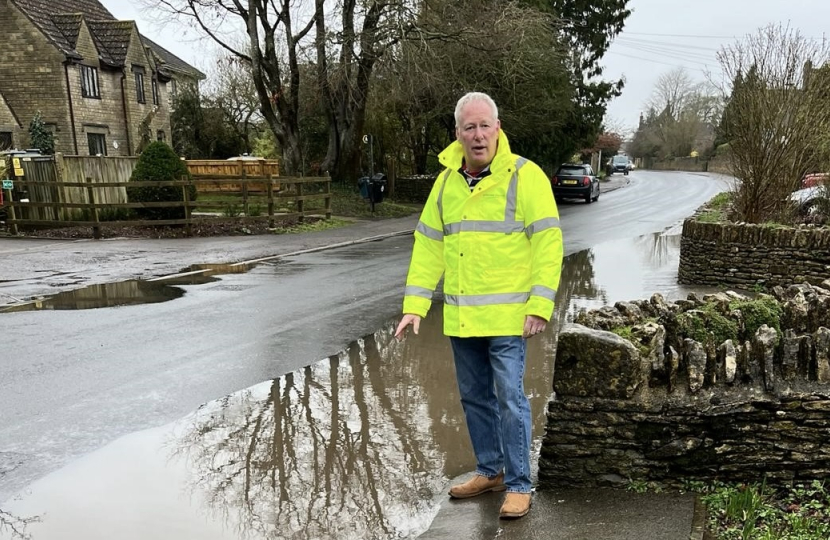
I’m always bemused when I read headlines such as “Extreme UK flood levels are happening much more often than they used to”. You only need live in an area prone to flooding to experience how true that is. My ancestral home was in Lacock and anyone familiar with that tiny village will tell you stories of flooding around the bridge and how it gets worse every year.
It is vital that our local infrastructure is able to cope. We have all seen that, with increased surface run-off over the last 20 years, homes that were never in a flood risk area, have suffered from flooding. Fields and open spaces are regularly unusable due to being waterlogged, and local businesses are often left counting the cost due to floodwaters destroying their goods and even preventing them from opening their doors to customers.
During Storm Babet I was out all day in Royal Wootton Bassett helping to direct traffic around local roads closed due to flooding. This was compounded by the closure of the M4 following extreme flooding near Dauntsey where over 40 households endured flooded homes.
Understanding flood risk and knowing which risk management authorities are responsible for managing different types of flood risk is important in enabling individuals and communities to become more resilient.
Interestingly, Highways England have now accelerated a scheme to increase culvert sizes on the M4 overpasses – something I have been lobbying for and liaising with the agencies on for over 15 years.
Being the victim of extreme flooding can be upsetting and stressful and it is important to work with the agencies during this difficult time in order to move forward through the recovery process as efficiently as possible. Being aware of who is responsible for managing flood risk and who to report flooding incidents to has allowed me to help and support residents to deal with their flooding situations as quickly and as efficiently as possible by the correct authorities.
It is sadly the case that when flooding has occurred, we have a tendency to immediately apportion blame or try and find someone we can hold accountable for the damage caused to us and the disruption to public services. It is also true that the various public and government bodies that are responsible for managing flood risk and undertaking alleviation works to reduce flood risk, are unlikely to be able to completely eliminate the risk and it is unfair to hold them wholly accountable for flood events.
At a local level, I am currently the Wiltshire Councillor with portfolio responsibility for flooding across the county. It is a role I take seriously and one I am passionate about getting right.
I recently chaired the Operational Flood Working Group for the North of Wiltshire on where all stake holders and statutory authorities came together to analyse the flooding and assess how mitigation measures can be implemented to help in the future. This is a positive step forward but I am also keen to hear your views on flooding and flood mitigation. You can email me at [email protected].
Something needs to be done to tackle these issues. I fear that if we do not act now, the situation regarding flooding in certain areas of the constituency will only get worse.






